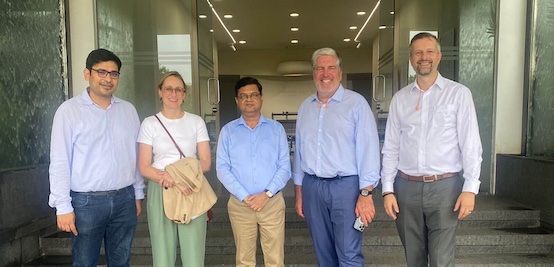#Recycled_Fibers
Circ announces its first sourcing partnership with H&M Group
The Lenzing Group, a global leader of regenerated cellulose fibers, plays a central role in this partnership. For the first time, Circ’s recycled pulp will be commercialized through Lenzing’s global supply chain in the form of TENCEL™ | Circ® with REFIBRA™ Technology. Lenzing’s REFIBRA™ technology uses textile waste as a raw material, in addition to wood sources from certified or controlled origins, giving waste a new life. Within this partnership the Lyocell fiber branded under TENCEL™ | Circ® with REFIBRA™ technology is crafted with 30% Circ® pulp from recycled textile waste. This milestone showcases how existing fiber platforms can be leveraged to unlock circularity at scale.
This global launch builds on the global SWITCH2CE program led by the United Nations Industrial Development Organization (UNIDO), and a two-year pilot with Intellecap and H&M Group, through which Circ piloted its recycling technology with H&M Group’s suppliers in Bangladesh, successfully recycling 2.6 tonnes of polycotton waste into Circ® Lyocell and Circ® Polyester. Circ was selected for its blended fiber recycling capabilities as well as its commitment to continuously assess and optimize their process to reduce environmental impact as they scale. The project proved the commercial viability of Circ’s platform within local supply chains and laid the groundwork for this global launch.
“Collaborating with key partners on projects like Circ is essential to our vision: to grow our business decoupled from resource use and extraction, with products and materials circulating at their highest value,” said Cecilia Strömblad Brännsten, Head of Resource Use and Circularity at H&M Group.
“True circularity will require the entire value chain to work together. By integrating Circ’s recycled pulp into Lenzing’s REFIBRA ™ technology and partnering with H&M Group, we’ve demonstrated how existing mill relationships and fiber platforms can be leveraged to make circular fashion commercially viable,” said Florian Heubrander, Executive Vice President Commercial Textiles at Lenzing Group.
“H&M Group brings global fashion scale, and Lenzing brings decades of fiber expertise. Together they provide the infrastructure needed to make circular fashion commercially viable,” said Peter Majeranowski, CEO at Circ®. “By working with partners of this caliber, we’re showing how fiber producers and global brands can close the loop at commercial volumes. This builds on our work through the UNIDO SWITCH2CE program with H&M Group, which proved our technology could recycle blended textile waste within local supply chains. What we’re announcing today is the next step of turning pilots into global practice.”
“Through pilot projects like our collaboration with H&M Group and textile suppliers in Bangladesh, UNIDO helps de-risk investments in innovation that strengthen competitiveness and resilience. By advancing a circular value chain approach through public-private partnerships, we are accelerating climate-smart solutions that can be scaled for lasting impact.” said Mark Draeck, SWITCH2CE Chief Technical Advisor at UNIDO.
The upcoming products have been developed through collaboration across the supply chain. For the menswear denim, made with TENCEL™ | Circ® with REFIBRA™ technology the fiber was woven into fabric by AGI Denim. For the womenswear fleece sweatshirt, Circ recycled PET chip was converted into polyester staple fiber by Palmetto and then knitted into fabric by Fakir Knitwear. Circ’s technology is designed to fit smoothly into existing manufacturing, allowing partners to adopt circular materials without disruption. Through initiatives such as Circ®-Ready, Circ works with supply chain partners to make circular fashion possible at scale.
Garment samples from this collaboration will be on display at The Textile Exchange Conference 2025 in Lisbon, Portugal, October 13–17, 2025.















